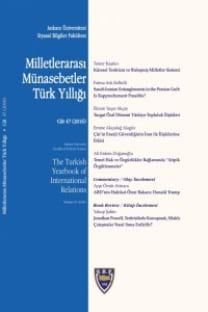The Osce Human Rights Norms An The Decoons-Making Process Of Foreign Policy With A Human Rights Objective; The Case Of Turkey
The Osce Human Rights Norms An The Decoons-Making Process Of Foreign Policy With A Human Rights Objective; The Case Of Turkey
This article deals with international norms influencing foreign policy of a state. It looks at the extent to which the OSCE human rights norms influence foreign policy. It also presents the results of a questionnaire survey carried out in Turkey. As far as the types of norms are concerned, the OSCE human rights norms have been divided into substantive and non-substantive norms. The following conceptual hypothesis has been constructed: nonsubstantive human rights provisions of the OSCE documents have more influence than substantive ones on foreign policy with a human rights objective. The research has shown that the OSCE human rights norms guide the decision-making process of foreign policy with a human rights objective. It has also shown that non-substantive human rights provisions of the OSCE documents guide the decision-making process of foreign policy with a human rights objective more than substantive human rights provisions. It is, hovvever, important to note the fact that Turkey has human rights problems, and is in the way of becoming Europeanised, has affected the extent of guidance of the OSCE human rights norms in foreign policy
Keywords:
The OSCE, Human Rights, Decision-Making Process, Foreign Policy Turkey,
- ISSN: 0544-1943
- Yayın Aralığı: Yıllık
- Başlangıç: 1960
- Yayıncı: Ankara Üniversitesi Siyasal Bilgiler Fakültesi Uluslararası İlişkiler Bölümü
Sayıdaki Diğer Makaleler
THE W AY FORWARD FOR EQUAL OPPORTUNITIES BY SEX IN EMPLOYMENT IN TURKEY AND BRITAIN
Özlem ÖZKANLI, Mustafa F.ÖZBİLGİN
Refugee Policy The Turkish Republic
Biritish Attitude Towards Turkey'S Policvies In The Middle East 1945-47
Expert Opinion; New Challenges Facing The United Nations
Esdp-Nato Relations; Considerations On The Future Of European Securty Architecture
